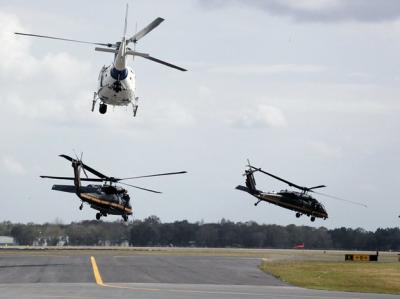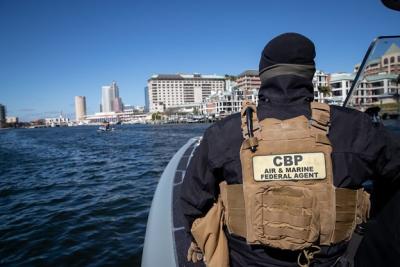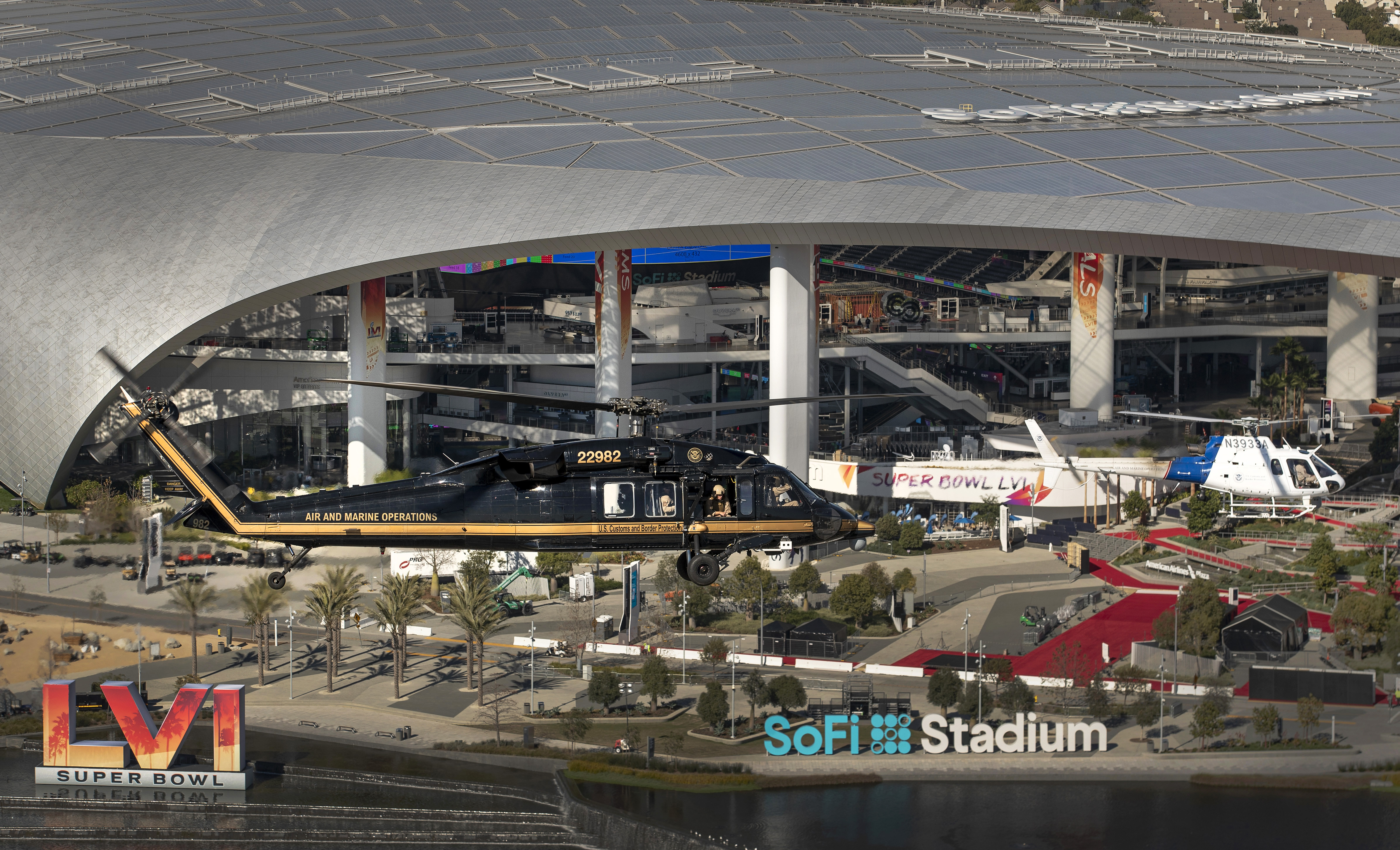
First Team All Stars
A U.S. Customs and Border Protection Air and Marine Operations UH-60 Black Hawk and an AS350 A-Star pass by SoFi Stadium in Inglewood, California, Feb. 6. CBP photo by Glenn Fawcett
The weeks, months and even years of preparation have paid off. With the teams scoring big wins, overcoming some defeats and working through adversity, they have been able to make it to Southern California for the biggest event of the year: Super Bowl LVI. With balanced approaches on the ground, in the air and, in this case, even on the seas – plus formidable defenses to thwart any opponent – the teams ran the gauntlet of a season that wasn’t always certain in its outcome. But they’ve made it this far, and they’re determined to keep going until ultimate victory. But we are not talking about the Los Angeles Rams and the Cincinnati Bengals; this is a team of highly trained and dedicated officers, agents and civilians from the three uniformed components of the United States’ largest law enforcement agency, U.S. Customs and Border Protection. The ultimate victory for this group is a safe and secure Super Bowl for all to enjoy. Being in a new Super Bowl location – the Los Angeles suburb of Inglewood – means new law enforcement partners for this year’s game.
“With each new location, we rely on well-established agency relationships while also fostering new ones to bring together all of our federal, state and local security resources,” said Chief Patrol Agent Aaron Heitke, the U.S. Border Patrol’s agent in charge in San Diego who is also running this year’s CBP security efforts at the Super Bowl. “We here at CBP have a long history of securing this incredible event and understand the importance of ironclad partnerships with fellow federal, state and local law enforcement agencies. Although we all work to secure California communities, this is a big state and we don’t work together every day. Strong communication and planning is key.”
Heitke said each component of CBP – primarily Air and Marine Operations, who secure the border from the air and sea; the Office of Field Operations, the CBP officers at international airports and ports of entry; and the Border Patrol, who work between the nation’s ports of entry – brings unique skills to the table. It’s much like how different football players have different skill sets that mesh to become one effort: offensive and defensive linemen who are the “heavies” up front, clearing the way; skill position players who catch and carry the ball or defend against the long pass and watch for “trick” plays; and a quarterback and supporting coaching staff who look for issues as the game unfolds – all coming together for a winning combination.
“My job is ensuring coordination between all CBP components and then linking them with the U.S. Secret Service, the lead for all federal efforts,” Heitke said. “In addition, we ensure CBP assets and personnel are prepped and ready to work with state and local partners, as well, like the Inglewood Police Department and California Highway Patrol [and all the other law enforcement partners in the area]. That’s the most critical piece: opening lines of communication, sharing resources, and building relationships that last.”
Heitke added that having first-time interactions with a new law enforcement partner can actually work to their advantage in two ways: There are no assumptions, and it builds a new partnership that they can tap into in the future, if the need should arise.
“We have the opportunity to start with a clean slate, without any preconceived notions of what can or cannot be done,” he said, adding CBP is massive and brings a wide variety of specialized skills and capabilities. “It’s a matter of informing our state and local partners of what is available and how much more efficient security efforts become when experts come together.”
Air Defense
Air and Marine Operations will have a large piece of the action. Although it is the smallest uniformed component of CBP, Air and Marine Operations will bring in aircrews, helicopters and airplanes to help keep an eye on activities from above. In addition, Air and Marine Operations’ boats and crews on the water will also help ensure nothing gets past that shouldn’t be.
“Air and Marine Operations is pretty unique. By virtue of our day-to-day job – securing the land border mission, the maritime domain awareness mission, and the investigatory mission – we use a lot of technological capabilities that are exportable to other mission sets,” said Brandon Tucker, usually in charge of Air and Marine Operations in San Diego and taking his component’s lead at the Super Bowl. “What we’re bringing to the table for the Super Bowl is a pretty robust, secure tactical communications suite that we can include state, local and federal [law enforcement], and we can fuse all those together into one communications solution.”
Air and Marine Operations’ five helicopters, three fixed wing aircraft, one coastal interceptor vessel on the water, and flight crews to include boat operators, pilots, navigators, and radar and camera operators in the back of the aircraft – approximately 40 agents total – will give all other law enforcement operators a clear, live video picture of what’s going on at a number of venues in the area. The information is shared with the command centers in Southern California as well as CBP headquarters back in Washington, D.C. Air and Marine Operations will also maintain a “no-fly zone” for the stadium area, making sure no one gets into the secure area by air. In addition, they will coordinate with the U.S. military to conduct airspace security with multiple crews flying planes and helicopters to monitor and secure the airspace around the stadium, conduct aerial surveillance, and coordinate command and control for non-defense assets from its Air and Marine Operations Center in Riverside, California.
“If someone enters into that temporary flight restriction area, all of our Black Hawk helicopter pilots are intercept qualified, and they will join up on that aircraft and instruct it to land,” Tucker said.
The San Diego Air and Marine Branch has enough people, planes and helicopters to get this job done, but some aircraft and crews from other parts of the country will be brought in to help to make sure they are still fulfilling their regular mission of border security.
While the birds in the air are important, what makes them work are those men and women on board with their deductive skills.
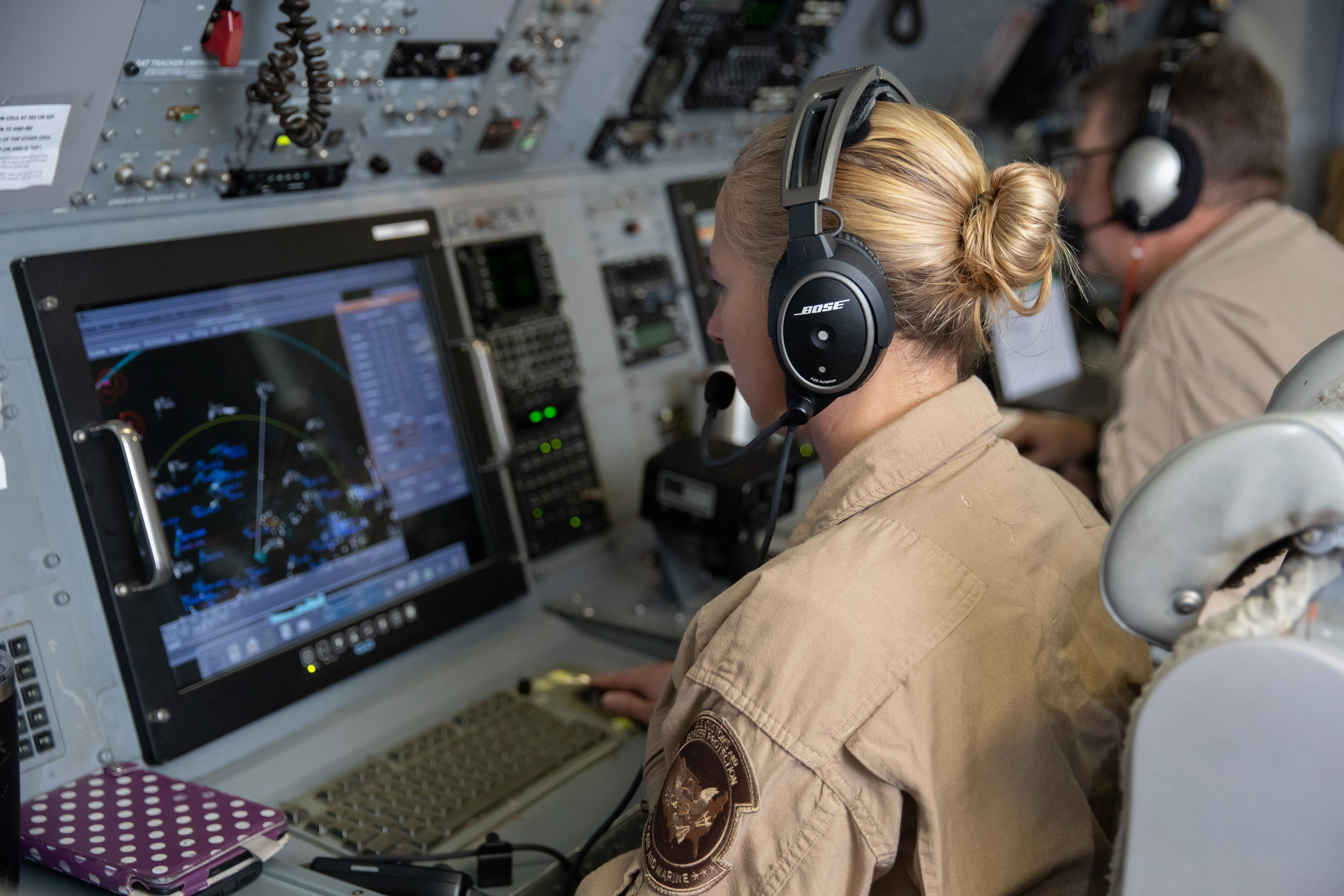
In this file photo, an aviation enforcement agent watches the radar in the back of an Air and Marine Operations aircraft. Other agents will perform similar duties at this year’s Super Bowl. CBP photo by Ozzy Trevino
"We’ll be looking for any suspicious activity,” said Aviation Enforcement Agent Beata Levy, who will work the cameras from the back of Air and Marine Operations’ multi-role enforcement airplanes. She said what qualifies as “suspicious” is part of her training to recognize the unusual and part “gut feeling” that something just doesn’t belong.
“The little things that just don’t make sense, just don’t feel right,” she said. Her 15 years as a Border Patrol agent before she joined Air and Marine Operations last July helped hone her observational skills. “People acting nervous, not doing the typical things. That’s kind of what we look for.”
And she can’t wait for it, especially since this is her first Super Bowl.
“I’m very excited to be part of this and this team!” Levy said.
Her colleague, Aviation Enforcement Agent Daynesha Bumanglag, pointed out how important their presence is in the skies above.
“The type of situational awareness we are able to provide to agents and/or officers on the ground is very imperative in helping out with any situation or task at hand,” Bumanglag said. “We’re seeing it from a bird’s eye view, and that’s a capability they may not have.”
Boat crews on the seas, such as ones with Marine Interdiction Agent Evan Wagley, will patrol the coast of California just like they do every day.
“Our main job is going to be boarding any boats that may seem suspicious, may seem out of place,” Wagley said. He added the observational skills he uses every day will be a great benefit in their work to protect the Super Bowl. “To the layman, any boat coming in may not appear to be doing anything different. But there are definitely red flags for us and little things that can be very subtle, but we can pick out.”
Some of what he’ll look for is a boat that is running too deep in the water – plowing, as he calls it. It’s an indicator that something – or some bodies – might be stored below, and the boat operator is trying to sneak them in. But they’ll also look for tell-tale signs from the boat occupants.
“Just how that person is acting can really play a big part in whether we think something’s going on: being overly nervous, not making eye contact, being shifty with their documentation or not having documentation – all those things are pretty obvious to us that something’s going on there,” he said.
Wagley added that while people think the Pacific Ocean is calm – Pacific actually means “peaceful in character” – the waters are far from that and pound the smuggling boats and his vessels.
“The maritime environment can be extremely unforgiving,” for the migrants and the agents alike, he said. “We’ve had some pretty harrowing experiences trying to save people.”
He added they’ll rely heavily upon the “eyes in the sky” his colleagues in the planes and helicopters will provide, as well as information they might receive from other law enforcement partners.
Ground Defense
The Office of Field Operations will have its hands full as well, as the approximately 65 men and women who will work the game will have a variety of duties. Many will be responsible for checking each vehicle coming into the stadium area – from trucks hauling everyone’s favorite food and beverages to the van that will deliver the Super Bowl trophy just before the game. They’ll use three large, portable X-ray trucks, known as Vehicle and Cargo Inspection Systems, to see inside and clear the vehicle for entry in just a matter of minutes or, if something that shouldn’t come in is detected, giving CBP officers on the ground the heads up that they need to check it out firsthand. In addition, Field Operations will play a vital role in making sure counterfeit goods – fake NFL jerseys, championship rings, and other merchandise – are intercepted before they can get into the unsuspecting hands of consumers and send money to illicit operations such as drug smuggling and human trafficking.
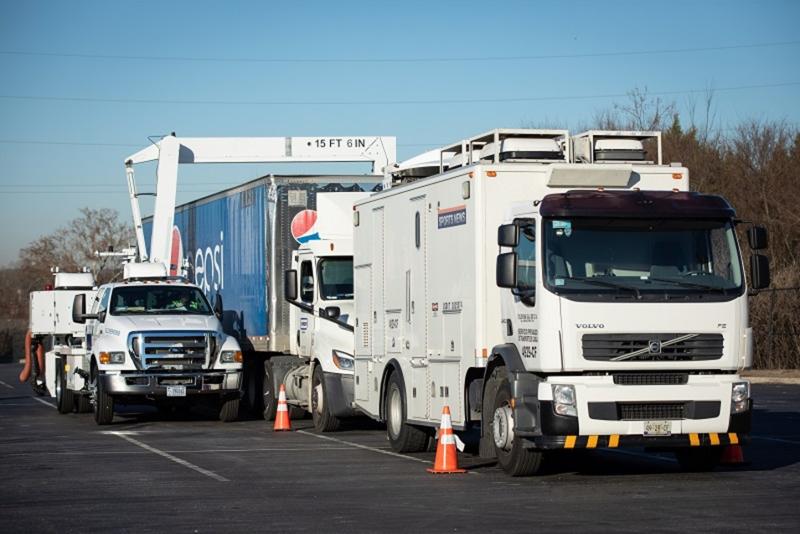
officers scan all vehicles and shipments entering the
stadium area, just as they will do this year in Los Angeles.
CBP photo by Ozzy Trevino
“We’re going to bring our equipment, high-end technology and capable operators to identify anything that shouldn’t be in those trucks entering the facility,” said Carlos Martel, the director of Field Operations for CBP’s Los Angeles area office and in charge of the component’s operations leading up to the Super Bowl. He said they also have officers trained to recognize those being trafficked – basically, a modern form of slavery – into sweat shops and prostitution. “We’ll be targeting travelers coming into Los Angeles to identify individuals, handlers, and organizations trying to capitalize on that type of business in this area.”
As mentioned, a large part of Field Operations’ responsibilities will be the X-ray trucks scanning what comes into the stadium area. In the run-up to the game, CBP will screen thousands of vehicles that carry in the food, souvenirs, high-definition television equipment and fans to celebrate this year’s Super Bowl. A large X-ray machine for semitrailers is used, while a smaller, more mobile version of the same technology mounted on the back of a truck is used to scan personal vehicles, delivery vans and recreational vehicles. The X-rays save CBP officers a lot of time, allowing vehicles to be searched in just 7-10 minutes, which is much faster than searching each one by hand.
The large X-ray machine scans both sides of large items, including semis and cargo containers and is usually used at ports of entry. It is able to detect anything from big, hidden compartments down to small packages or even handguns. It even detects people being smuggled in a trailer or vehicle.
The smaller, vehicle-mounted scanner does basically the same thing, but fits in a box on the back of a truck and scans just one side of a vehicle.
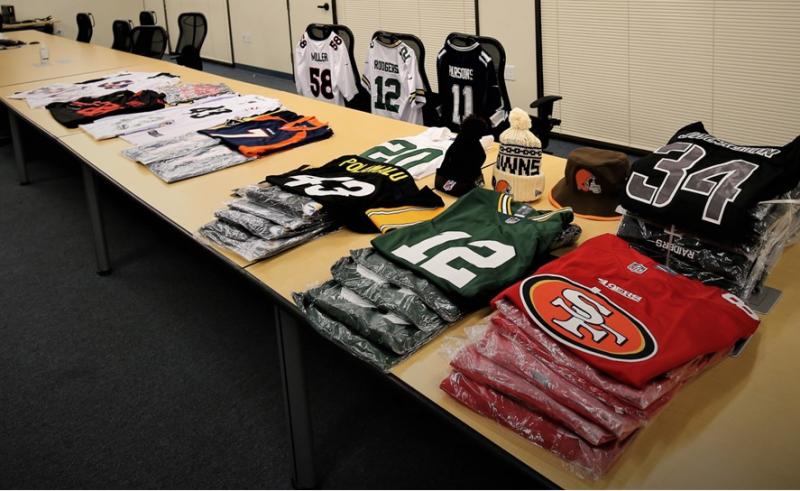
Another important aspect of CBP’s efforts is the protection of trademarks – or intellectual property rights – to ensure Americans aren’t buying counterfeit merchandise. This also has the benefit of keeping dollars raised from these sales out of the hands of criminal organizations that oftentimes are the purveyors of these fake goods and use the proceeds to fund nefarious activities such as the illicit drug trade or terrorism.
Trained import specialists with sharp eyes look at the smallest details, down to the stitching on a single shirt, to determine whether it is real or fake. These inspections don’t just happen in the run-up to the Super Bowl; the specialists inspect all sorts of items year-round and seized $9 million worth of products with intellectual property rights violations in fiscal year 2021 alone.
“We bring in particular skill sets: officers and import specialists who are knowledgeable on identifying intellectual property rights violations. We will be running operations to identify counterfeit shipments arriving by air and sea into the Los Angeles area,” Martel said. “We anticipate seizing a significant number of counterfeit shipments containing clothing, footwear, and various consumer products that have a nexus to the Super Bowl.”
Coordinators and Special Teams
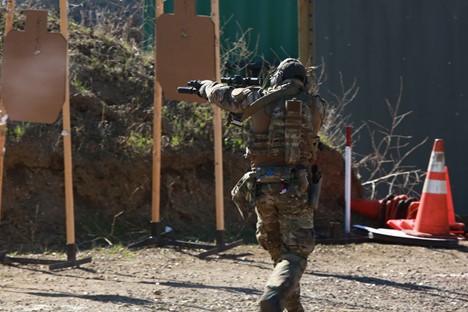
and will be ready to respond at a moment’s notice at
this year’s Super Bowl. Photo by Jeffrey Underwood
Border Patrol might be considered the offensive and defensive coordinators and special teams of CBP’s efforts in the weeks and days leading up to the game. Supporting Heitke will be Assistant Chief Patrol Agent Ryan Yamasaki out of San Diego. He will be in the emergency operations center, coordinating the information coming in from the CBP helicopters, boat crews, community relations people, X-ray truck operators and intellectual property rights specialists to other federal, state and local law enforcement agents also working the big game.
“The emergency operations center is going to be the culmination of all the components’ hard work,” Yamasaki said. “We’ll be the central node for all CBP operations in the region. We’ll be there to deconflict and track the resources.”
Yamasaki said with a venue of this size, it’s imperative they have this central hub for information gathering, coordinating and distributing back to those law enforcement partners, the higher headquarters for CBP and the Department of Homeland Security, and with those who have their boots on the ground (or on the sea and in the air, as the case might be). “It provides a uniform platform to work across all components.”
One of the Border Patrol’s teams that always brings its “A” game – whether it’s stopping violent illegal activities in a lonely desert location or fast-roping into an urban environment to back up other law enforcement – is the Border Patrol Tactical Unit. Much like a SWAT team, BORTAC, as they are more commonly known, include special operators who train constantly for the big moments that do not come up often but are vital to mission success. Think of them like the players who fly down the field on punt coverage and stop a potentially game-changing return.
“We’ll have two primary duties: security of the SoFi campus [the stadium for this year’s Super Bowl], and we’re also responsible for a quick reaction force,” said Special Operations Supervisor Ernie Martinez, who is in charge of the San Diego tactical team which will be ready to mount up in an Air and Marine Operations helicopter at a moment’s notice and charge into whatever situation is presented.
Approximately 70 special operators, including members of the tactical team and the Border Patrol’s Search, Trauma, and Rescue Team are being made available for the event. Martinez said they train for these types of events every day in their regular patrols just a bit further south in the San Diego area.
“Day-to-day, you never know what’s going to happen, so we stand by ready,” he said, adding they are spending the days leading up to the Super Bowl training for any eventuality and coordinating with other law enforcement agency’s tactical teams.
Martinez, who has spent 23 of his 25 years in Border Patrol as a member of tactical teams, said he and his team members live for the moments they hope never happen.
“If you want to upset a guy [on a tactical team], don’t let him do anything. They want to work. They want to serve. They want to protect,” he said.
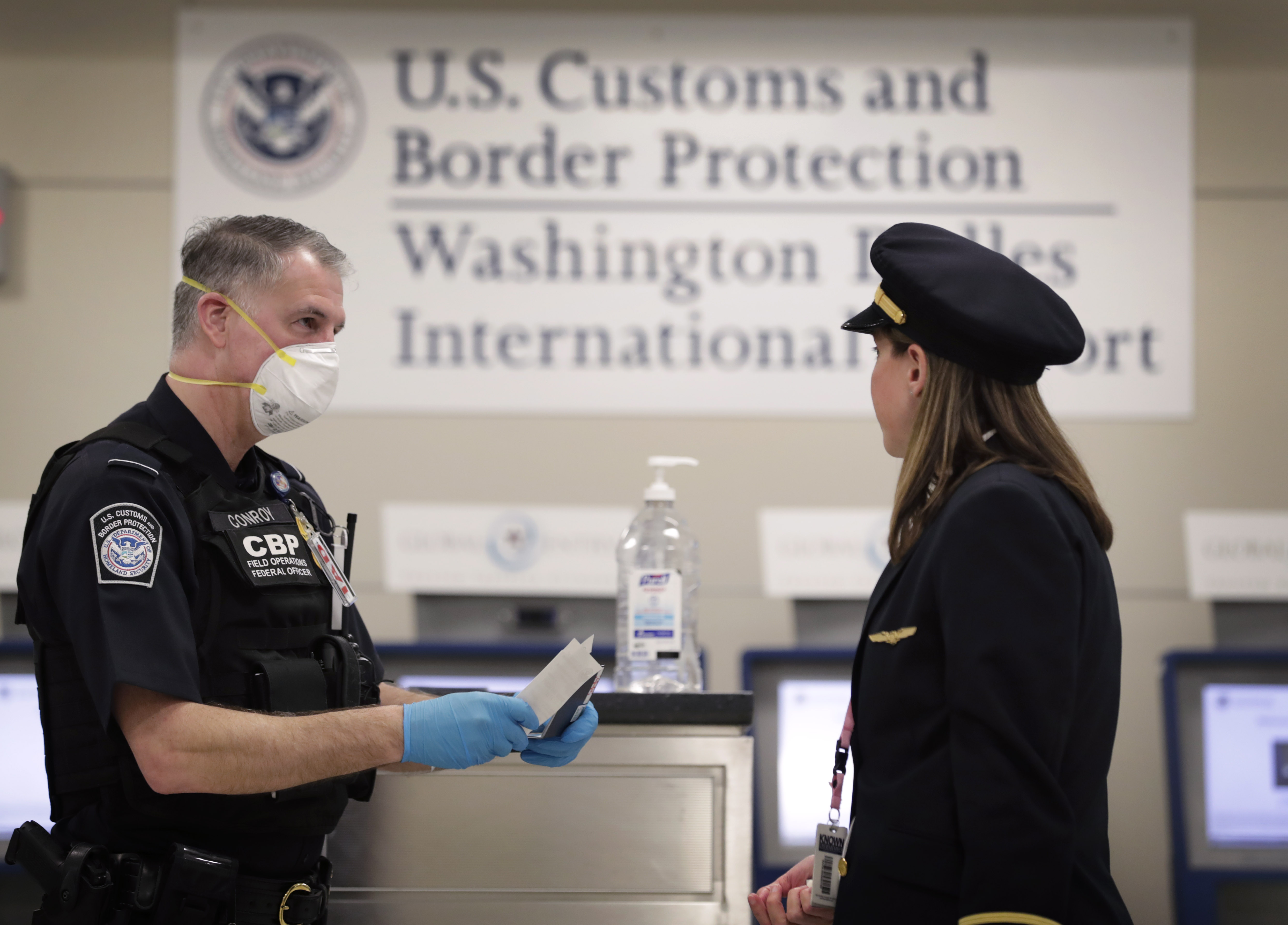
A CBP officer reviews the travel documents of an arriving international airline pilot at Dulles International Airport just outside of Washington, D.C. in March of 2020. In response to the coronavirus pandemic, CBP officers have donned personal protective equipment as they work on the front line of the crisis and will continue to use these safety protocols at this year’s Super Bowl in the Los Angeles area. CBP photo by Glenn Fawcett
Battling the Elements
Many times during a season, the football teams meet especially challenging elements at game time. Maybe it’s a heavy downpour; maybe it’s extreme heat or cold; maybe it’s a driving wind. But they must adapt and overcome to be ultimately successful. It’s no different for CBP. An especially challenging aspect for the agency – as it was last year – is the COVID-19 pandemic. The disease has sickened more than 74 million people in the U.S. alone and killed nearly 900,000, including infecting more than 21,600 CBP employees and killing 61. Special care is being taken to make sure CBP employees and the public are as safe as possible from the disease.
“This year having COVID – and the second Super Bowl with COVID – just throws another dynamic in there,” Heitke said. “With the current omicron variant, it’s been difficult to complete a lot of the [manpower roster] very far ahead of time [which the NFL prefers well in advance].”
But Heitke said his main concern is keeping his people safe and free from COVID, stressing safety protocols CBP put into place nearly two years ago and continues to update every day.
“We follow the CBP guidelines: masks, social distancing, everything we can do,” he said. “We’re encouraging everyone to get their boosters, and we’ll follow all the protocols for social distancing and sanitizing. With some of the security and checkpoints for this event, there will be some close contact, but we do that every day, whether we’re arresting someone or inspecting at our ports of entry. Our folks are really good at it.”
A Total Team Effort
While oftentimes the sports shows highlight the play of the individual players and coaches, true fans know that the quarterback could not have thrown that winning touchdown without the other 10 members of the team on the field along with the myriad of coaches and trainers off the field. The linemen had to keep to their blocking assignments; the receivers had to run their routes to precision; the running backs needed to carry out their fakes to fool linebackers into not dropping back into coverage so that star quarterback and star receiver could make that connection the world eventually sees. It’s no different for Team CBP.
“This is what we do every day,” Heitke said. “We have the subject matter experts in so many areas and such an enormous workforce that we can really help smaller state and local agencies by bringing that to them.”
“This isn’t our first rodeo,” Martel said, pointing out that his Los Angeles office has been supporting high profile events, such as the Rose Bowl and grand prix races, for some time. And he added Field Operations is unique in its ability to do scannings, to intercept counterfeit merchandise, and to stop human traffickers. “We’re not just experts at these; we’re really the only entity in the area that can provide that level of expertise and support.”
“We’re out here doing this seven days a week, 52 weeks a year,” Tucker said, adding the urban environment could pose some challenges, but his crews with their vast experiences are up to the task. “Air and Marine Operations has a pretty experienced workforce to start with. Many Air and Marine agents are former military or agents [from another CBP component]. So, I could set any mission set on their laps tomorrow, and they would execute flawlessly because of their experience.”
While the unexpected could happen, Heitke feels confident his team of veterans, rookies and people with skill sets of all varieties – just like the Rams and Bengals – made the right preparations and are more than ready for the big game.
“Right now, we’re tying up all the loose ends and ensuring complete preparation,” Heitke said, adding that while he hopes the game is a thriller, a boring security operation is what he’s cheering for most. “Together, alongside our fellow law enforcement professionals, our job is to ensure this historic event is safe and secure for the whole world to enjoy.”



